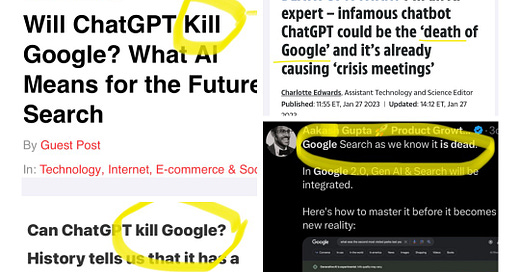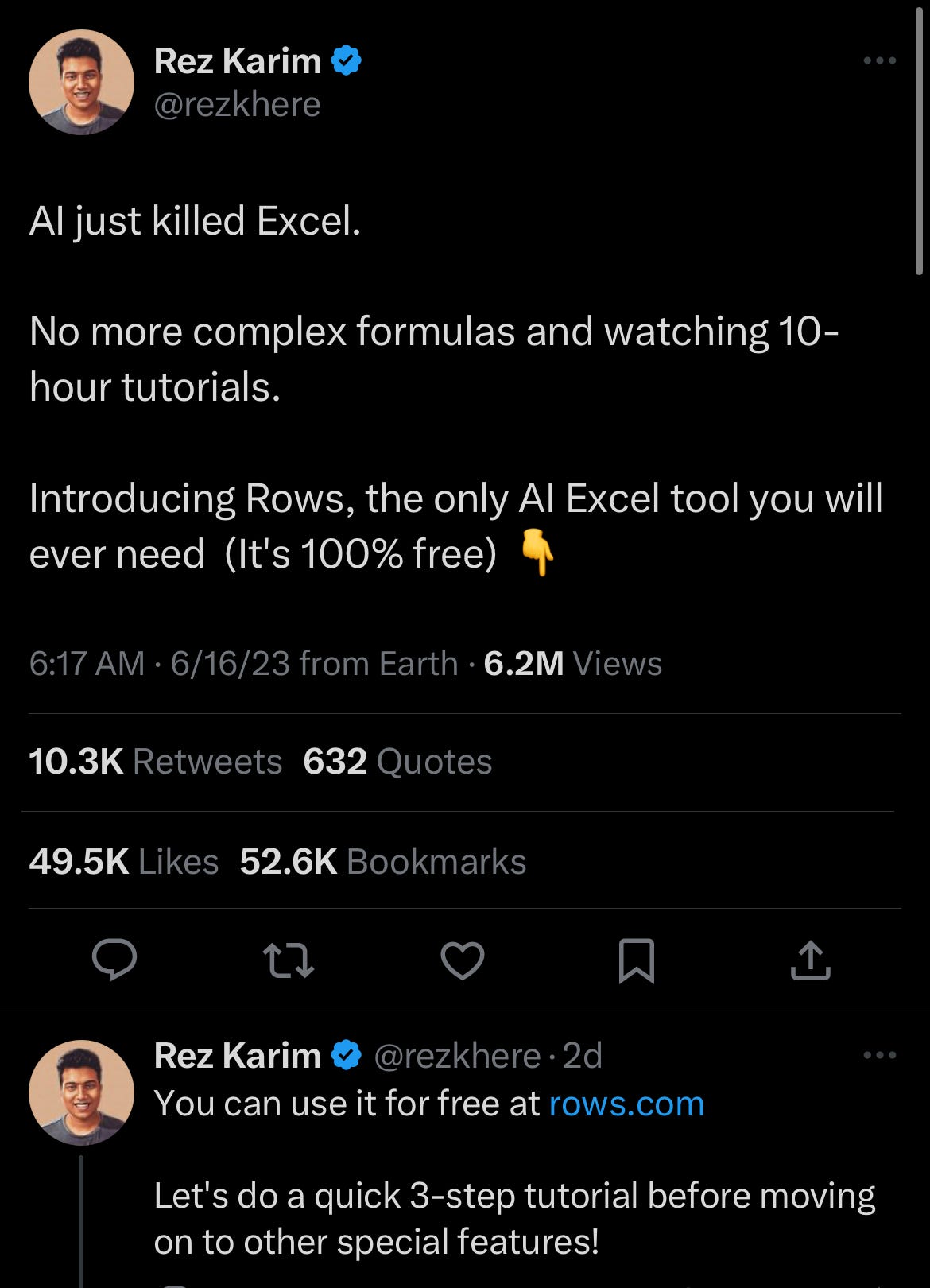Google: Reports of My Death Are Greatly Exaggerated
Where will AI benefits accrue and why financial efficiency matters even more
Google and Microsoft Excel are both dead apparently. Clickbait news articles and Twitter threads from “AI experts” have been relentless for several months now.
While slightly misquoted, the below quote has been attributed to Mark Twain based on a letter Twain sent to a newspaper reporter who had asked Twain about rumors that he was dying:
The reports of my death are greatly exaggerated
When ChatGPT came out folks were quick to say “Google is dead”. Then Google released their AI chatbot (known as “Bard”) and then folks decided that maybe Google will survive. Then these experts were quick to declare Microsoft Excel as dead because of some AI tools that do some cool analysis…
An ongoing question is where do the benefits of AI accrue both short-term and long-term?
Who has the advantage?
There are three primary advantages companies have (or can obtain) in the AI platform shift:
Data
More valuable proprietary data means better trained AI models, which are more valuable to users.
Distribution
Those that already have the audience and users can easily add AI as a feature (or as entirely new product). AI is becoming table stakes and software consolidation continues to happen as companies drive toward efficiency.
Speed and Innovation
Those who can adopt new technologies faster and be more innovative in its application before the competition.
Large incumbents typically have the data and distribution advantage over startups. The advantage startups typically have is speed/innovation.
Startups can move faster and be more innovative because they aren’t afraid to break things and disrupt existing business models. Large incumbents are historically slower to innovate and they resist disrupting their business model because they risk hurting their established profitability margins. They become addicted to their high profit margins and fear investor’s wrath for the perceived misallocation of capital, so innovation with large companies is typically much slower.
However…the innovation shift with AI will unfold a bit differently because the power of AI is universally accepted.
Who Benefits From AI?
No, I don’t think Google or Microsoft Excel are dead…
In the last week, a lot of Twitter threads from the “AI experts” exploded on my Twitter feed with basically the exact same message as below — clearly sponsored posts to get their name out there. Good marketing because it has clearly gotten a lot of eyeballs.
But can a startup (or anyone else) kill Microsoft Excel or Google overnight with AI?
Excel has something like 1 billion users, has been around for almost 40 years, and is part of a much larger suite of products. If I was a betting man, I would bet that most accountants and finance professionals will still be using Microsoft Excel in 10 years — but the product will probably look much different then it does today.
Admittedly, some of these startups are probably doing some cool things that Microsoft Excel can’t yet. Startups can move faster!
But…there is a significant difference this time in the fight between startups and the large incumbents: Everyone has realized immediately that AI is the future.
The large companies know they have to disrupt their business models and innovate with AI — many of them are actually leading the charge in this innovation. Their board of directors, investors and other stakeholders understand that if they don’t embrace AI quickly then they will be killed.
Adding AI is not an “if” but a “how fast”.
Due to the universal acceptance that every tech company must adopt AI to some degree, startups will not have the same level of advantage that they have had in prior technology changes.
Can Startups Win?
Some things I think startups should consider in the AI technology shift that will be different than prior technology shifts:
Shortened speed advantage
In prior technology shifts it may have taken incumbents years to adopt a new technology, innovate, and disrupt existing business models. We are already seeing that is not the case with AI. Startups will often still move faster but the time advantage will be significantly shorter since adopting AI is universally accepted as a necessity in all technology businesses (i.e. incumbents aren’t waiting around to see if this whole “generative AI” thing is worth it).
The idea of “stacking S-curves” is to find the next lever for growth before the current one flattens and falls.
Startups can keep stacking S-curves, but the hockey stick up slope on the S-curve might be a lot shorter with AI than prior technology shifts.
Efficiency is more important
Because of the shortened speed advantage mentioned above, startups need to be more financially efficient. The prior acceptable software unit economic benchmarks may not work with this AI.
This is not like the transition from on-prem software to the cloud which took most of the incumbents years to fully adopt. When startups had several years of a head start they could afford to spend a lot more money to “blitzscale” the opportunity because the potential lifetime value of their customers was much bigger since the competition was so slow to catch up. This allowed startups to catch-up on incumbent moats (like data and distribution).
But now each S-curve needs to be more efficient because it won’t last as long. We are currently in that hockey-stick growth phase of the S-curve for many AI startups, but they are going to be punched in the face a lot sooner than most expect by the incumbents. They will need to create the next S-curve sooner and be more financial efficient for the unit economics to make sense.
The below four-week old AI company raised an insane amount of money based on no progress/product (just a dream). We are quick to forget that large sums of money raised too early generally creates an inefficient culture, which I don’t think will work out well for most companies in the current AI shift…
Efficiently Blitzscaling
The term blitzscaling was popularized by Reid Hoffman (LinkedIn co-founder & VC).
Blitzscaling is a specific set of practices for igniting and managing dizzying growth; an accelerated path to the stage in a startup's life-cycle where the most value is created. It prioritizes speed over efficiency in an environment of uncertainty, and allows a company to go from "startup" to "scaleup" at a furious pace that captures the market.
Many associate Blitzscaling with some form of growth at all costs (sacrificing efficiency to capture the market). While inefficiency is a byproduct of blitzscaling, the level of inefficiency must be appropriate for the sustainable growth that is obtained.
Blitzscaling is even more important in the AI wave, but how it is done will probably be different.
S-curves will need to be stacked faster than before
Companies will need to be more efficient because of the shorter S-curves
Concluding Thoughts
Startups can’t rest on their laurels (i.e. become complacent) with their first mover advantage with AI because the incumbents and everyone else will be very close behind.
Attention to financial efficiency (and unit economics) is going to be even more important as companies have to more frequently create new growth opportunities. Old benchmarks and timelines are less relevant right now.








The AI start-ups will get punched in the face harder than other start-ups have, much quicker.
I'd never bet against an incumbent with market share, high revenues, high profit, and the best people.
So many of these AI Start-Ups are building features in the incumbent platforms.
Descript is a good example of this - except for the AI voice clone, Adobe has now developed far more superior features to their already incredible suite.
This feels like another FinTech & CLM rush for investment that has happened over the last 5 years.
Google has gotten much harder to use though - way too much junk and outdated or sponsored content for most searches...
How Google Ruined Financial Writing (And ChatGPT Might Save It)
https://emergingmarketskeptic.substack.com/p/how-google-ruined-financial-writing-chapgpt-ai
If you know anything about investing/finance, forget getting writing work from most financial sites or blogs that focus on Google rather than readers. How ChatGPT & AI could change that.